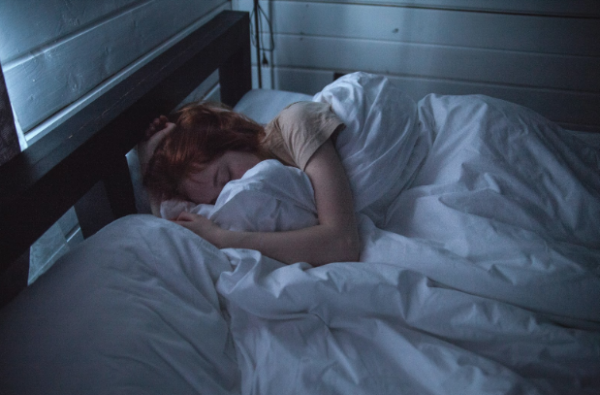
Guest Blogger: Julie Bomengen
Julie is a Vermont Licensed Clinical Mental Health Counselor (LCMHC) with 23 years of experience in the field of mental health. Julie is also a Nutritional Therapy Consultant (NTC), a certification of the Nutritional Therapy Association. She lives, works and plays in Lamoille County.
While most of us have an intuitive drive and love for sleep, many of us don’t understand how a good night’s rest impacts our mental and emotional well-being. Today’s blog is going to unpack Sleep as a Pillar/Foundation for Mental Health. A compromised sleep-wake cycle alters brain activity and the neurochemicals that directly affect our mood and executive functioning (ie: working memory, cognitive flexibility, and self-control), and undermines the processes intended to restore our minds and bodies to a normal, healthy baseline. Protecting the quality and quantity of our sleep is one of the most critical interventions we can do to improve overall mental, emotional, and physical functioning.
Our sleep-wake cycle is controlled by the HPA (Hypothalamus, Pituitary, Adrenal) Axis which controls cortisol production on a 24-hour Circadian Rhythm. When our sleep-wake cycle is rhythmic, cortisol drops at night to help us fall asleep and increases in the early morning hours to help us wake up. Acute or chronic stress, unresolved trauma, drug and alcohol use, pain, blood-sugar dysregulation (hypoglycemia), misuse of caffeine, illness, and hormone imbalances, among other things, can all impact the level of cortisol in the body, affect our sleep patterns, and exacerbate symptoms of or lead to depression, anxiety, PTSD, PMS, ADHD, dementia, and Bipolar disorder. Ongoing disruption of this essential psychological-biological rhythm reinforces mental distress and becomes a vicious cycle of symptoms that disrupt sleep patterns and sleep disturbances that often develop into mental health disorders.
Research has shown that sleep, and REM sleep or dream sleep, in particular, plays a major role in mood regulation and that increasing our time in REM sleep reduces depression. When we are sleeping, our Autonomic Nervous System (ANS) gets a chance to be in Parasympathetic Mode – time to put the brakes on and rest, digest, relax, restore, renew, detoxify, and integrate information and experiences from the day. All important reasons to safeguard sleep.
Our use of technology exerts a considerable impact on both the quality and quantity of our sleep. The blue-green wavelength that screens emit depresses melatonin, the sleep hormone that is released when the sun goes down. For this reason, blue light acts as a stimulant to the brain, making it hard to feel relaxed, settle down, and fall asleep. Easily accessed devices create an all-too-easy and convenient distraction for most people, often leading to a disconnect from real-time experiences and relationships, misuse of time, and a disruption of the circadian rhythm. Behavioral habits of checking and rechecking our devices can often set a negative or anxious tone for the day, and as stress hormones are released, feelings of anxiety increase. Often, even before people are getting out of their beds in the mornings, they are tired, stressed, and irritable from their dysregulated sleep. Beginning the day with a deficit is no fun for anyone!
Ways to protect and improve your sleep and mental and emotional wellbeing:
- Discontinue use of all technology at least 1 hour prior to going to bed and ideally, leave your device charging outside of your bedroom in order to reduce distractions, increase intimacy (by the way, snuggling releases oxytocin – the human bonding/relational hormone!), and protect the quality and quantity of your sleep. Use blue light blocking glasses at night and consider installing the f.lux program onto your devices which makes the color of your computer screen adapt to the time of day, thereby modulating its stimulating impact.
- Develop a relaxing bedtime ritual (we create them for our children, why not for ourselves?) which might include reading, showering, a magnesium-rich (the relaxing mineral) epsom salts bath 30 minutes before bed, gentle stretching, listening to music, drinking herbal tea, aromatherapy, massage, herbs such as valerian root tincture, hops, passionflower, or with the support of an experienced practitioner use supplements that support circadian rhythm which include melatonin, B12, and lithium orotate.
- Establish a regular sleep-wake cycle 7 days a week, choosing your be-in-bed-by-time and your lights-out time. Doing your best to stick with this cycle every night will better support the 24-hour rhythm that will ensure healthy sleep patterns and improved mental, emotional and physical health. One of the reasons why it’s often difficult to get going on Monday mornings is because people change up their bedtime routines over the weekend which throws off the sleep-wake cycle and makes for a sluggish start to the week.
- Consider pairing your dessert or alcohol (a.k.a. “liquid sugar” – more on this in a future blog) with food earlier in the evening or omit them altogether to help in eliminating the impact of blood-sugar dysregulation on your sleep patterns. When we consume sugars before bed, our blood sugar levels spike and then come down 2-4 hours later in the middle of the night, waking the individual up as a result of our body’s alarm sensing what it perceives as concerning or dangerously low blood sugar levels. Eliminating sugars and alcohol several hours before going to bed and/ or enjoying a protein or healthy fat snack before bed (ie: avocado, nuts, cheese, egg, turkey and other high tryptophan foods) will help individuals fall asleep and stay asleep more successfully.
- Limit your use of caffeine to earlier in the day, remembering that caffeine (including energy drinks) that is consumed in the late afternoon for that pick-me-up boost often contributes to insomnia.
- Because elevated stress hormones (adrenaline, cortisol, and norepinephrine) can lead to memory and attention problems, irritability, and sleep disorders, work diligently to manage stressors by engaging in some form of relaxation, meditation, breath work, or progressive muscle relaxation exercises. Apps like Insight Timer, Calm, and Headspace can be helpful aids for meditation and stress management. Another tip is to write down your worries or to-do’s on a piece of paper that you leave outside of your bedroom, creating a boundary between your “doing” self and your “being or sleeping” self.
- Keep your bedroom dark (consider an eye mask and room darkening shades) and cool (60-67 degrees F, adjusted to personal preferences) to ensure a restful night’s sleep.
- Limit the bedroom to sleeping or intimacy. Your bedroom is not your office!
- Daily, regular exercise, particularly high-intensity workouts, but ideally before 4 p.m. Physical activity helps relieve stress, reduces cortisol production and helps normalize sleep patterns.
- Exposure to bright natural light or use of a full-spectrum lamp on a daily basis is helpful in supporting quality sleep patterns, particularly for people who experience Seasonal Affective Disorder (SAD). Getting outside every day helps – even when it’s cloudy, which Lamoille County often is!
- Use habit-forming sleep medications as a last resort as they will further interfere with your body’s ability to restore a natural Circadian Rhythm.
Resources to Further your Education and Information:
- https://www.health.harvard.edu/staying-healthy/blue-light-has-a-dark-side
- http://www.stop-being-tired.com
- https://www.health.harvard.edu/newsletter_article/sleep-and-mental-health
- https://www.nami.org/Learn-More/Mental-Health-Conditions/Related-Conditions/Sleep-Disorders
- http://www.clevelandclinicwellness.com/Pages/GoToSleep.htm
- https://www.psychologytoday.com/us/blog/rhythms-recovery/201612/5-essential-strategies-insomnia
- “Sleep Smarter: 21 Proven Tips to Sleep Your Way To a Better Body, Better Health and Bigger Success” by Shawn Stevenson
Originally published May 14, 2019 on Live Well Lamoille.
